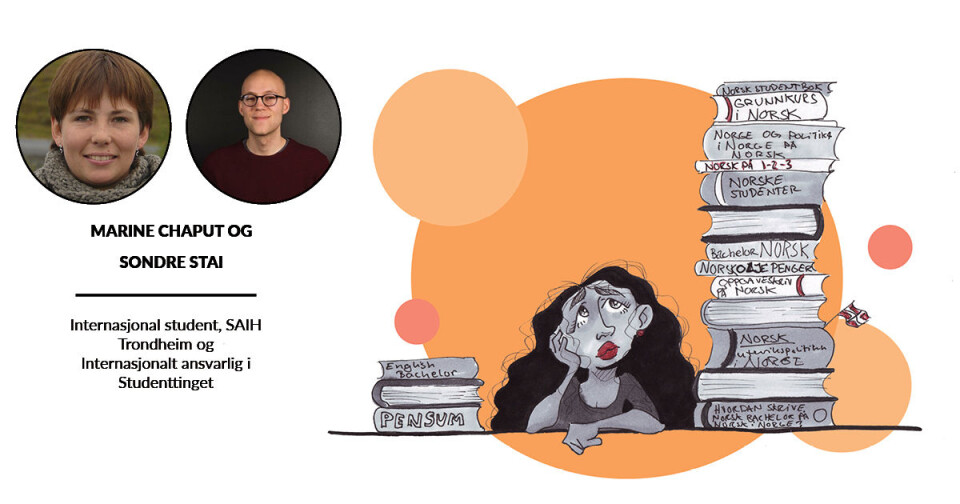
More English at NTNU
NTNU should follow the example of Bergen, which has been able to offer bachelors taught in English, writes Marine Chaput and Sondre Stai.
Tekst: Marine Chaput, Sondre Stai
NTNU has become the most important university in Norway with the reunification of Trondheim, Gjøvik and Ålesund. The university has a strong impact on an international level with the arrival of 3000 international students every semester. This is why we have to talk about English bachelor degrees.
NTNU’s International Action Plan of 2014-2017 is coming to an end. To summarize, the plan has three important parts: participation in the global knowledge society, international mobility, and internationalization of programs of study. In this plan there are many important measures of internationalization like student exchange, internships, strategic partnerships, and summer schools. Because of this plan, many courses at master’s level have been created in English. However, NTNU does not offer any bachelor programs in English. This is a severe shortage for our university.
This year, NTNU did not receive a single student from the Students at Risk program. This is a program that gives student activists who have been expelled from university or in other ways hindered from completing their education because of their non-violent engagement for human rights and democracy, an opportunity to fulfill their degree in Norway. Gunnar Bovim has stated that Students at Risk should be a permanent program in Norway, but how can the students come to NTNU without English bachelors? We should follow the example of Bergen, which has been able to offer choices of English bachelordegrees, and received several Students at Risk.
One of the great things about courses taught in English, is solidarity to international students, which is more important now than ever. This is because the Quota Scheme has been shut down. The Quota Scheme was a program which main objective was to contribute to capacity building through education that would benefit the home country of the students when they returned. It is replaced by two programs called the Panorama Strategy and Norpart. The main difference is that these new programs do not have a fixed number of scholarships to students from developing countries. Now, all international students apply in the same pool, which tends to favour the BRICS-countries. With this change away from the Quota Scheme the aspect of solidarity is lost. This is why we have to make Students at Risk work, and this can not be done without English bachelors at NTNU.
The development of English bachelors contributes to solidarity with international students, ensuring that the university becomes more attractive on an international level. This opportunity would also allow Norwegian students to be better equipped to work abroad after they graduate. There are already several courses taught in English at NTNU, which makes the creation of full bachelor degrees in English natural. Finally, universities need an English bachelor if they want to emerge as one of the largest universities in the world.
In conclusion, the lack of English bachelors at NTNU is stopping international students from coming to Trondheim through the Students at Risk program. It is also a shame for such a large university not to offer an English bachelor to Norwegian students. NTNU has the opportunity to attain two goals at the same time. By creating English bachelor programs, NTNU can be both solidaric and build the international reputation of the university.

































